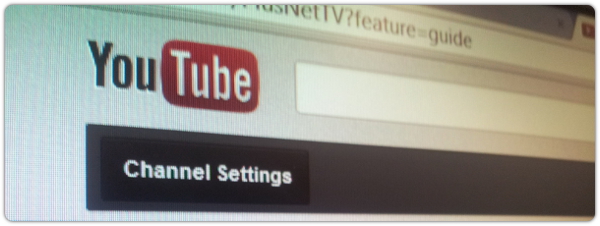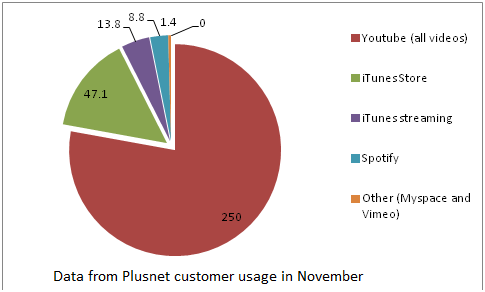Modern music trends: gigs, streaming, and profits
- Subscribe to RSS Feed
- Mark as New
- Mark as Read
- Bookmark
- Subscribe
- Printer Friendly Page
- Report to Moderator
- Plusnet Community
- :
- Plusnet Blogs
- :
- Modern music trends: gigs, streaming, and profits
Modern music trends: gigs, streaming, and profits
 Recently we’ve been curious about how people interact with music: how and where they listen to it, how much money they spend on it, whether they want to see it live, and so on. We took a look at our recent bandwidth breakdown to see where people interacted with music online – the main contenders aren’t so surprising: Youtube, iTunes, Spotify, Myspace and Vimeo were among the most popular. The advent of these new methods of consuming music in recent years has raised many questions within the industry. One popularly asked is whether wider availability of music will have an effect on concerts, in terms of price, attendance, and methods of participation. Sceptics think that people will be so captivated by the free music available to them (both legally and illegally) that they’ll shun spending money on music in any form, and demand for concerts will fall. Others believe that consumers’ increased opportunities to explore and discover new music cheaply will increase their desire to become more involved with artists they like – through a live, in person experience. Whichever viewpoint you take, it is undeniable that streaming services are increasingly popular. The demand for these services can be clearly seen from looking at our bandwidth usage - the graph below shows weekly terabyte (TB) usage attributed to a selection of popular streaming services:
Recently we’ve been curious about how people interact with music: how and where they listen to it, how much money they spend on it, whether they want to see it live, and so on. We took a look at our recent bandwidth breakdown to see where people interacted with music online – the main contenders aren’t so surprising: Youtube, iTunes, Spotify, Myspace and Vimeo were among the most popular. The advent of these new methods of consuming music in recent years has raised many questions within the industry. One popularly asked is whether wider availability of music will have an effect on concerts, in terms of price, attendance, and methods of participation. Sceptics think that people will be so captivated by the free music available to them (both legally and illegally) that they’ll shun spending money on music in any form, and demand for concerts will fall. Others believe that consumers’ increased opportunities to explore and discover new music cheaply will increase their desire to become more involved with artists they like – through a live, in person experience. Whichever viewpoint you take, it is undeniable that streaming services are increasingly popular. The demand for these services can be clearly seen from looking at our bandwidth usage - the graph below shows weekly terabyte (TB) usage attributed to a selection of popular streaming services:  If we’re to believe an article on Digital Music News, Spotify won’t be around in 5 years. This prediction may seem fairly sensible when looking at their net losses in 2012: -€58.7, but the service is still currently going strong in user terms: over 24 million active users in the past 30 days (Spotify statistics) (although to contrast, Youtube has had over 1 billion unique users in the last month! (Youtube statistics)) It’s hard to gauge, from a consumer’s perspective, how much support you’re offering an artist when using the services mentioned above. The legality of the services suggests that the artist will make money from it, but is this always the case? In an attempt to shed some light on the issue, artists such as Zoe Keating have published their information on their earnings from a variety of sources. Zoe, an instrumental cellist, said in her self-published earnings document that “in my opinion artists should view [Spotify] as a discovery service rather than a source of income”. So, we’ve seen that demand for streaming services is high and increasing, but what about concert attendance? If we’re to believe the sceptics, this should be decreasing – luckily, this doesn’t appear to be the case. A survey carried out by Ticketmaster in 2012 found that 37% of Americans planned to go to more concerts in this year. They also found that attendance increased in all earning brackets between 2011 and 2012, but increased mostly among those earning over $75,000 (~£47000) Another interesting point is the opportunity for synergy between streaming and concerts. Visual recordings of gigs are nothing new (in fact, they’ve been filmed for decades), but live streams are a slightly newer phenomenon (the first in 1993!).Live streams of concerts offer the best of both worlds – the artist makes money from the fans who want the real experience, whereas the more casual fans can watch from home, effectively giving the artist wider reach and impact. There is definitely demand for this method - looking at our bandwidth figures, there’s a clear increase in iPlayer traffic when Glastonbury was streamed this year (to the volume of 20%). To summarise - there are plenty of people debating the future of the music industry already and it looks like we’re in for some interesting innovations that will continue to change the landscape of music consumption methods will to suit ever changing needs of the people involved in the industry. We’re interested to know what you think of music online. How do you listen? Have you ever discovered an artist online that you don’t think you’d have listened to otherwise? Do you feel gigs are changing, and if so what’s causing these changes? Would you prefer streamed gigs, or is there something irreplaceable about being there in person? Put your comments below – let’s get a discussion going!
If we’re to believe an article on Digital Music News, Spotify won’t be around in 5 years. This prediction may seem fairly sensible when looking at their net losses in 2012: -€58.7, but the service is still currently going strong in user terms: over 24 million active users in the past 30 days (Spotify statistics) (although to contrast, Youtube has had over 1 billion unique users in the last month! (Youtube statistics)) It’s hard to gauge, from a consumer’s perspective, how much support you’re offering an artist when using the services mentioned above. The legality of the services suggests that the artist will make money from it, but is this always the case? In an attempt to shed some light on the issue, artists such as Zoe Keating have published their information on their earnings from a variety of sources. Zoe, an instrumental cellist, said in her self-published earnings document that “in my opinion artists should view [Spotify] as a discovery service rather than a source of income”. So, we’ve seen that demand for streaming services is high and increasing, but what about concert attendance? If we’re to believe the sceptics, this should be decreasing – luckily, this doesn’t appear to be the case. A survey carried out by Ticketmaster in 2012 found that 37% of Americans planned to go to more concerts in this year. They also found that attendance increased in all earning brackets between 2011 and 2012, but increased mostly among those earning over $75,000 (~£47000) Another interesting point is the opportunity for synergy between streaming and concerts. Visual recordings of gigs are nothing new (in fact, they’ve been filmed for decades), but live streams are a slightly newer phenomenon (the first in 1993!).Live streams of concerts offer the best of both worlds – the artist makes money from the fans who want the real experience, whereas the more casual fans can watch from home, effectively giving the artist wider reach and impact. There is definitely demand for this method - looking at our bandwidth figures, there’s a clear increase in iPlayer traffic when Glastonbury was streamed this year (to the volume of 20%). To summarise - there are plenty of people debating the future of the music industry already and it looks like we’re in for some interesting innovations that will continue to change the landscape of music consumption methods will to suit ever changing needs of the people involved in the industry. We’re interested to know what you think of music online. How do you listen? Have you ever discovered an artist online that you don’t think you’d have listened to otherwise? Do you feel gigs are changing, and if so what’s causing these changes? Would you prefer streamed gigs, or is there something irreplaceable about being there in person? Put your comments below – let’s get a discussion going!
